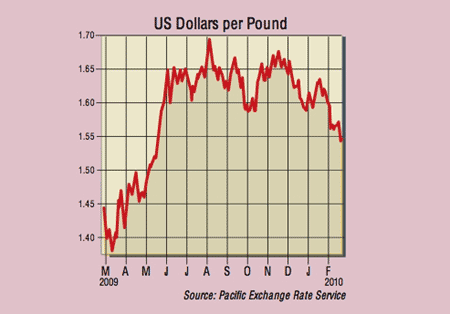
The “nascent recovery is fragile”, Bank of England governor Mervyn King warned this week. The Bank may need to resume its quantitative easing (QE) programme. That downbeat statement capped a dismal few days of data releases. In January, mortgage approvals for new house purchases fell back to last summer’s levels. Figures from the British Bankers’ Association showed that lending to non-financial companies has continued to fall. The stock of outstanding loans is 5% down on last year, and consumer credit has now fallen for ten successive months.
Unemployment rose again in January and high-street spending slumped by almost 2% month-on-month. So retail sales are now less than 1% up on January last year. And tax receipts were so poor in January that the government had to borrow £4.3bn, rather than run a surplus, as is usual for the month. At this rate the deficit in the year to April could exceed Greece’s 12.7% of GDP.
What the commentators said
Where is growth going to come from? Public-sector demand will decline as the deficit is reined in and the household sector is “impaired”, as the FT put it. No wonder. Its debt hit 181% of disposable income at the peak of the boom (compared to 132% in the US) and now consumers, “nervous about their jobs, are saving keenly”. The ongoing slide in consumer credit shows they want to cut back, given the “very worrying economic environment”, agreed Howard Archer of HIS Global Insight. It also reflects “a lack of unsecured credit from banks”.
The broader point here is that “the newly printed money is not feeding through”, said Ian Campbell on Breakingviews. Growth in the money supply has been weak. QE has not been able to change the fact that banks continue to repair their balance sheets while companies and consumers are also deleveraging. So it’s hard to see what more printed money would achieve.
Unfortunately, the outlook for external demand isn’t encouraging either. The recovery in the eurozone, which takes around half our exports, seems to have “stalled”, as King pointed out. Growth fell back in the fourth quarter and German business confidence has slid for the first time in over a year. Given all this, the double-dip many had pencilled in as a threat for the end of the year “may arrive rather sooner”, said Nils Pratley in The Guardian. Hardly surprising, then, that sterling has lost over 5% against the dollar this year. Quite apart from the lousy growth outlook, the gaping hole in the public finances and threat of a cut in Britain’s triple-A rating will keep the pound under pressure, said Phil McHugh of Currencies Direct. Indeed, “it would take little”, said Campbell, “for the UK to suffer a pre-election Greek-style crisis in which the once high-flying pound plays Icarus”.